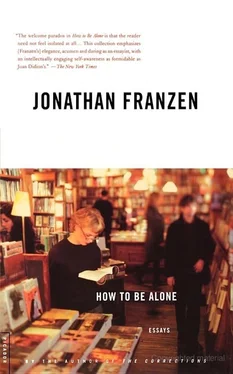The novel is whatever novelists are doing at a given time. If we’re not doing the big social novel fifteen years from now, it’ll probably mean our sensibilities have changed in ways that make such work less compelling to us — we won’t stop because the market dried up. The writer leads, he doesn’t follow. The dynamic lives in the writer’s mind, not in the size of the audience. And if the social novel lives, but only barely, surviving in the cracks and ruts of the culture, maybe it will be taken more seriously, as an endangered spectacle. A reduced context but a more intense one.
Writing is a form of personal freedom. It frees us from the mass identity we see in the making all around us. In the end, writers will write not to be outlaw heroes of some underculture but mainly to save themselves, to survive as individuals.
DeLillo added a postscript: “If serious reading dwindles to near nothingness, it will probably mean that the thing we’re talking about when we use the word ‘identity’ has reached an end.” The strange thing about this postscript is that I can’t read it without experiencing a surge of hope. Tragic realism has the perverse effect of making its adherents into qualified optimists. “I am very much afraid,” O’Connor once wrote, “that to the fiction writer the fact that we shall always have the poor with us is a source of satisfaction, for it means, essentially, that he will always be able to find someone like himself. His concern with poverty is with a poverty fundamental to man.” Even if Silicon Valley manages to plant a virtual-reality helmet in every American household, even if serious reading dwindles to near nothingness, there remains a hungry world beyond our borders, a national debt that government-by-television can do little more than wring its hands over, and the good old apocalyptic horsemen of war, disease, and environmental degradation. If real wages keep falling, the suburbs of “My Interesting Childhood” won’t offer much protection. And if multiculturalism succeeds in making us a nation of independently empowered tribes, each tribe will be deprived of the comfort of victimhood and be forced to confront human limitation for what it is: a fixture of life. History is the rabid thing from which we all, like Sophie Bentwood, would like to hide. But there’s no bubble that can stay unburst. On whether this is a good thing or a bad thing, tragic realists offer no opinion. They simply represent it. A generation ago, by paying close attention, Paula Fox could discern in a broken ink bottle both perdition and salvation. The world was ending then, it’s ending still, and I’m happy to belong to it again.
[1996]
I realize that this is a dismal confession, and that my managing to slip through college without ever taking a course in either American history or American literature is hardly an excuse.
Certain novelists now regularly receive calls from movie-industry scouts asking about the progress of their book; when the manuscript is completed, often one copy will go to Manhattan and another to Los Angeles.
Tom Wolfe’s manifesto for the “New Social Novel” (Harper’s, November 1989) was probably the high-water mark of sublime incomprehension. What was most striking about Wolfe’s essay — more than his uncannily perfect ignorance of the many excellent socially engaged novels published between 1960 and 1989, more, even, than his colossal self regard — was his failure to explain why his ideal New Social Novelist should not be writing scripts for Hollywood.
There is cyber-philosopher Brenda Laurel, speaking to the Times : “In the V.R. field, there’s kind of a naive belief that we’re able to do. . what Tim Leary calls screen each other’s mind, well suddenly get a whole lot better at understanding each other. I know this sounds squishy, but I really believe it.”
Last fall the word “literature” appeared twice on the magazine’s cover: “The Roseanne of Literature” (profile of Dorothy Allison) and “Want Literature? Stay tuned!” (“The Triumph of the Prime-Time Novel”).
The popularity of role-playing m on-line MUDs (multiple-user dialogues) and chat rooms, which enthusiastic theorists extol for their liberating diffractions of selfhood, in fact merely confirms how obsessed we all are with a superficially defined “identity.” Identity as a mystery (the continuity of consciousness from your childhood through the present) or as manners (how kind you are, how direct, how funny, how snobbish, how self-deceptive, how ironic; how you behave) is evidently weightless in comparison to the assertion: “I am a twenty-five-year-old bi female in fishnet stockings.”
If the rolls of nineteenth-century literary societies are any indication, women have always done the bulk of fiction reading. But in a society where a majority of women both work and take care of their families, it’s significant that, even today, two out of every three novels purchased are purchased by women. The vastly increased presence of women in serious American writing probably has explanations on both the supply side and the demand side. An expanded pool of readers with unexpected lives inevitably produces an expanded pool of writers. And sometime around 1973, when American women entered the workplace in earnest, they began to demand fiction that wasn’t written from a male perspective. Writers like Jane Smiley and Amy Tan today seem conscious and confident of an attentive audience. Whereas all the male novelists I know, including myself, are clueless as to who could possibly be buying our books.
I realize that this is a dismal confession, and that my managing to slip through college without ever taking a course in either American history or American literature is hardly an excuse.
Конец ознакомительного отрывка
Купить книгу












